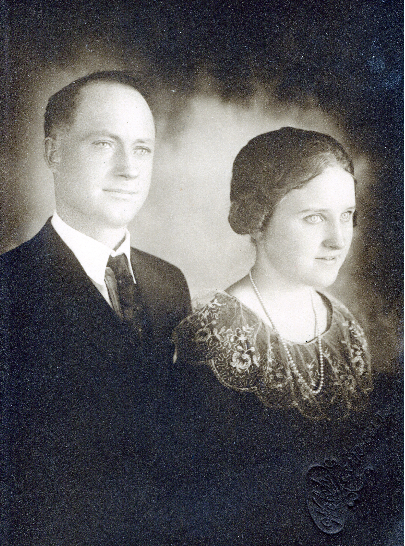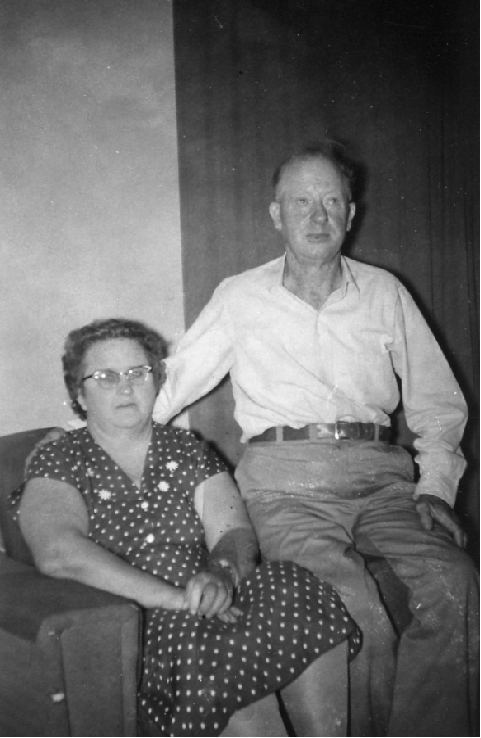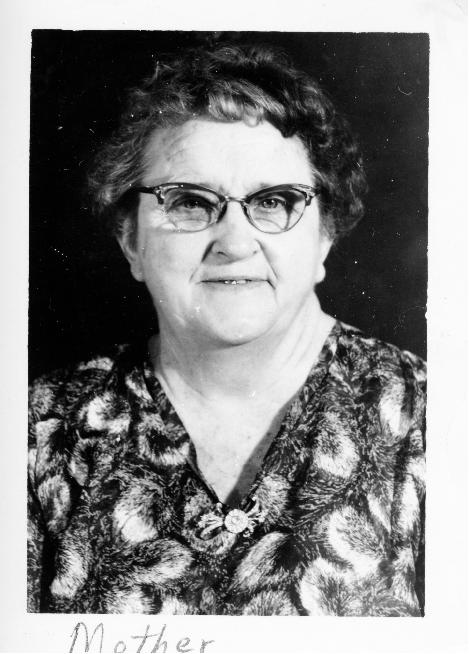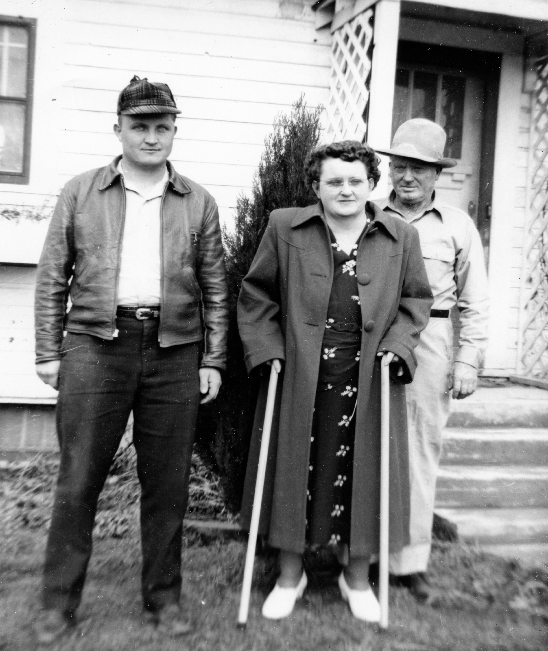Desperation. Stress about money, marriage, or work. Unspeakable sadness after a terrible loss. Fear, despair, depression, physical exhaustion, mental exhaustion, financial hardships and losses, the list goes on. These are things many of us have felt at one time or another. This is a part of life here on earth. No one escapes without encountering the hardships and trials of life. As Christians, the way we respond when we encounter these hardships and trials ought to be different than the typical responses found out in the world. I have not lost a child, or lived without electricity, or built my home with my own hands, but I’d like to tell you a story of two people who did just that.
 In October of 1904, Frances Louise Reagor, known as Louise, was born at Flat Creek, Tennessee. She was one of six children. Other than losing her little sister when she was four years old, Louise had a happy childhood. At the age of thirteen, Louise embarked on an adventure with her family as they moved to Great Divide, CO, which is about 40 miles northwest of Craig. It was there that she met John Addison Breach.
In October of 1904, Frances Louise Reagor, known as Louise, was born at Flat Creek, Tennessee. She was one of six children. Other than losing her little sister when she was four years old, Louise had a happy childhood. At the age of thirteen, Louise embarked on an adventure with her family as they moved to Great Divide, CO, which is about 40 miles northwest of Craig. It was there that she met John Addison Breach.
John was born in 1890 at Lamoni, Iowa, weighing only 3 to 3 ½ lbs! When he was three months old, his family moved to Nebraska, traveling by covered wagon. He slept in a basket in the wagon, and at one point, after crossing a creek, his mother checked on him and found that all by his little face was covered by water. In 1917, John, two of his brothers, and his mother moved to Colorado. Lured to the Great Divide area by promises by the Colorado State Land Board that irrigation systems would soon be in place, John and his brothers, Glen and Fred, bought parcels of land. John worked hard on his land, clearing it of sagebrush, building fences, digging a well, building a little house, and planting crops. He had to travel twenty miles to obtain timber, he had to saw it and haul it home to build the house and corrals.
While working on his homestead, John came to know the Reagor family. Once Louise became a little older, John took notice of her blue eyes and began to pay visits to the family. They lived five miles apart and John began courting her in a horse drawn buggy. When John was 32 years old, and Louise was 18 years old, they were married.
A year later, Mildred, the first of seven “breach” babies was born (keep in mind that their last name was Breach). John added a room on to the house, making it a two room house. Glen was born next, followed by Wilma, Doris, Margaret, Wanda, and Lawrence. After six of the seven children were born, John and Louise bought a two room house, and with the help of a neighbor, they moved the house next to theirs and combined them to make a bigger home. The children had to ride horses to school each day, about four miles each way.
 Louise seldom had time to play with the children. She had a family of ten to care for, and her time was spent cooking, cleaning, washing, ironing, patching clothes, sewing, making quilts, making rugs, checking kids for ticks each night, and more. It was a hard life out in the sagebrush, but they lived there for 23 years, before they decided to move to Idaho. Their income came from wool from their sheep, cream from their cows, and furs from coyotes, badgers and weasels that John trapped. They ate sage hens that he shot, and one year, he traded a horse to a neighbor for 1000 pounds of beans. They lived on beans that year. Louise was not thrilled to see sagebrush wherever she looked and she missed the greenery of Tennessee. For John, however, he had worked for that land and that home for 23 years and it was harder to leave it. Still, the promise of irrigation systems was never fulfilled, there was no medical facility there, Louise worried her children might not find spouses there, and there was no church there. Louise and John read the bible to their children, taught them about baptism, sang with them, and taught them other scriptural teachings, but they had no congregation to worship and fellowship with. It was a life of great isolation and few luxuries.
Louise seldom had time to play with the children. She had a family of ten to care for, and her time was spent cooking, cleaning, washing, ironing, patching clothes, sewing, making quilts, making rugs, checking kids for ticks each night, and more. It was a hard life out in the sagebrush, but they lived there for 23 years, before they decided to move to Idaho. Their income came from wool from their sheep, cream from their cows, and furs from coyotes, badgers and weasels that John trapped. They ate sage hens that he shot, and one year, he traded a horse to a neighbor for 1000 pounds of beans. They lived on beans that year. Louise was not thrilled to see sagebrush wherever she looked and she missed the greenery of Tennessee. For John, however, he had worked for that land and that home for 23 years and it was harder to leave it. Still, the promise of irrigation systems was never fulfilled, there was no medical facility there, Louise worried her children might not find spouses there, and there was no church there. Louise and John read the bible to their children, taught them about baptism, sang with them, and taught them other scriptural teachings, but they had no congregation to worship and fellowship with. It was a life of great isolation and few luxuries.
They bought land in Greenleaf, Idaho, and first built a barn, which housed the family and would be used for the cows later. The family huddled by the stove to keep warm in the winter as they had no electricity. Louise took a job working at J.R. Simplot Dehydrator. Her job was to cut spots out of potatoes as they came down a wide belt prior to the dehydration process. Her shift was from 4pm to midnight. She would wake each morning to see the children off to school, and then sleep a bit more. She always left a note for the children, telling them what chores they had to do each day after school. The following year, John built a chicken house and the family moved in to the chicken house for 5 ½ years until their home was built. It was very hot in the chicken house in the summers as three meals a day needed to be cooked for ten people, as well as water heated for baths, washing clothes, and the iron had to be heated on the stove.
 John and Louise had a hard life, but did well managing their children and their work. They lived in poverty, with no luxuries but a radio, but they had shelter, food, and a loving family. The children did not ask for money or luxuries, and they appreciated any luxuries they did receive. They were taught the bible, they were taught respect, and they were taught responsibility. When they were told to do something, they obeyed without being told twice or counted to three. The girls were modest and not silly around boys. I find many parents today struggle to teach these values to their children, even within the church. Maybe that is because we live in a time of entitlement or have low standards for our children? How would we respond if we had to raise our children in a chicken coop for five years, or send our children off to school four miles away on horses, or live in a house with dirt floors? Would we be stronger? Tougher? More grateful for the comforts we have? More devoted to God?
John and Louise had a hard life, but did well managing their children and their work. They lived in poverty, with no luxuries but a radio, but they had shelter, food, and a loving family. The children did not ask for money or luxuries, and they appreciated any luxuries they did receive. They were taught the bible, they were taught respect, and they were taught responsibility. When they were told to do something, they obeyed without being told twice or counted to three. The girls were modest and not silly around boys. I find many parents today struggle to teach these values to their children, even within the church. Maybe that is because we live in a time of entitlement or have low standards for our children? How would we respond if we had to raise our children in a chicken coop for five years, or send our children off to school four miles away on horses, or live in a house with dirt floors? Would we be stronger? Tougher? More grateful for the comforts we have? More devoted to God?
We can look to books of wisdom and find many verses on hard work and riches.
Proverbs 24:30 – 34 reads:
I passed by the field of a sluggard, by the vineyard of a man lacking sense, and behold, it was all overgrown with thorns; the ground was covered with nettles and its stone wall was broken down. Then I saw and considered it; I looked and received instruction. A little sleep, a little slumber, a little folding of the hands to rest, and poverty will come upon you like a robber, and want like an armed man.
Proverbs 28:19-20:
Whoever works his land will have plenty of bread, but he who follows worthless pursuits will have plenty of poverty. A faithful man will abound with blessings, but whoever hastens to be rich will not go unpunished.
Further down in vs. 25:
A greedy man stirs up strife, but the one who trusts in the Lord will be enriched.
Ecclesiastes 2:9-11:
So I became great and surpassed all who were before me in Jerusalem. Also my wisdom remained with me. And whatever my eyes desired I did not keep from them. I kept my heart from no pleasure, for my heart found pleasure in all my toil, and this was my reward for all my toil. Then I considered all that my hands had done and the toil I had expended in doing it, and behold, all was vanity and a striving after wind, and there was nothing to be gained under the sun.
Riches are not evil, but they can be a hindrance if they are elevated in our hearts above God. This life is not meant to be easy. We received our punishment in the beginning when Adam and Eve sinned. We all sin and deserve the same punishment. In the end, it is a cursed earth, but we are not here for long.
James 4: 14-15 reads:
What is your life? For you are a mist that appears for a little time and then vanishes. Instead you ought to say, “If the Lord wills, we will live and do this or that.”
Perspective matters. If we have the correct perspective in life, it will make everything more bearable. We can remember that our hardships will not last long. Our lives are short and we have to live with eternity in mind. When we want to crawl back in bed in the mornings, or sit our children in front of the television instead of spending valuable time with them, or be disrespectful toward our husbands, or get on Facebook instead of reading scripture, we need to check our perspective. It may seem tedious to ask ourselves if our actions each day are helping us and our family make it to heaven, but it is so easy to get lost in our lives that are so filled with the distractions of our modern world.
I want to read you a quote from a book entitled, Desperation: Hope for the Mom who needs to breathe. “No matter how desperate we feel in certain phases of our lives, we are not defeated. We may feel absolutely bone-weary, and hormonal, and depressed or a little nutty, but we’ll get through it.”
It can be irritating to ask someone for help in these difficult times and hear them say, “This too shall pass,” but isn’t it the truth? It will pass and if you press forward toward the goal of heaven, it really won’t matter in the end. You may think it only possible to have a lifted countenance when facing daily trials, but let me share some more of John and Louise’s story.
 One Saturday, when Louise was 45 years old, she was having a laugh with her girls in the kitchen, dancing around and enjoying time with them before leaving for work. On her way out of the house, Wilma told her mother, “Mother, you sure have pretty legs.” Louise laughed, replied sarcastically, and went on her way to work with her daughters Mildred and Doris. She still worked at the dehydration plant, and now two of her girls worked there as well. When they finished their shift at 12:30 AM, a friend needed help with towing his car until it would start. He hooked up his car to Mildred’s, and they pulled him until his car started. It took a few tries, because each time after it started, he got out to disconnect the cars and it died again. The third time, Louise offered to get out and disconnect the vehicles. As she stepped between the two cars, another employee, who was speeding to get to the bar before it closed, slammed his car into Mildred’s car, which smashed into Louise, causing both of her legs to be smashed between bumpers. At least one of her legs and foot was turned around backwards. Her collarbone was broken and all of her ribs on the left side were broken.
One Saturday, when Louise was 45 years old, she was having a laugh with her girls in the kitchen, dancing around and enjoying time with them before leaving for work. On her way out of the house, Wilma told her mother, “Mother, you sure have pretty legs.” Louise laughed, replied sarcastically, and went on her way to work with her daughters Mildred and Doris. She still worked at the dehydration plant, and now two of her girls worked there as well. When they finished their shift at 12:30 AM, a friend needed help with towing his car until it would start. He hooked up his car to Mildred’s, and they pulled him until his car started. It took a few tries, because each time after it started, he got out to disconnect the cars and it died again. The third time, Louise offered to get out and disconnect the vehicles. As she stepped between the two cars, another employee, who was speeding to get to the bar before it closed, slammed his car into Mildred’s car, which smashed into Louise, causing both of her legs to be smashed between bumpers. At least one of her legs and foot was turned around backwards. Her collarbone was broken and all of her ribs on the left side were broken.
Louise was operated on that night. The family sat at the hospital and prayed all night. Both of Louise’s legs were amputated, one just above the knee, and the other just below the knee. She was in shock and so had received little anesthetic since they were afraid it would stop their heart. John stayed at the hospital, putting on a brave face. The children went to their Grandma’s for breakfast, where she told them it would be best for everyone to go to church. They went to services in the clothes they had on. The congregation received them with love.
Louise lived. She remembered the surgery and could hear them sawing through her legs, but couldn’t feel it. She had heard the doctor talking about how she wouldn’t make it. They had thought her unconscious, but she was able to quote them later. Three months later, she went home with heavy wooden legs. John built a new room onto the house for her since she couldn’t walk down the stairs. They had to pay medical bills and attorney fees as well as paying for the alterations to their home. Although their attorney forgave them their debts to him, they paid anyway. A year after her injury, she returned to work, but they were worried about her slipping on the floor, so she got a job tying flies at a fly fish factory.
Louise had an amazing attitude after her accident. She did not sit down to let others wait on her, she went back to gardening, she did housework and cooked, as well as continued making gifts for her family. She went through some times of depression and anger, but it didn’t last long. She was known to say, “I would rather be without my legs than be without my eyes or have to have dentures, so it could be worse.”
The end of hardship for the Breach family wasn’t over. Almost two years later, their daughter Wanda died. Wanda had a wonderful personality and a great sense of humor. She made friends easily and was loved by many. At the age of 13 or 14, she was baptized. After she died, they found notes and Bible verses in her school notebook. She was 16 years old. It was tragic for the family.
Six years later, John had his right leg amputated due to diabetes. His toe had become infected. First they amputated part of his foot, then they amputated his leg at the ankle, then at the hip. After his leg was amputated, they had to sell their farm. They bought a home and an apartment house for income. John worked doing maintenance both on their home and on the apartment house. He too, had a great attitude after losing his leg. He would joke, “No one can say Louise and I don’t have a leg to stand on.”
Louise and John taught their children through their example to be strong in determination to overcome problems, and if that was impossible, then to accept and make the best of them. They set an example of a Christian attitude through good times and bad times. Maybe their example can inspire us, too. I am proud to say that John and Louise are my great grandparents.
We are not facing the arena or being martyred for the name of Christ, but we do suffer in this life. All people do. How we respond is what matters. What is our goal? Is it in the forefront of our mind? Don’t let life bog you down and defeat you. It’s not worth it. God has given us tools to overcome. We have the assurance of heaven, instructions on how to get there, and a church family to support us on our way. Use these tools and keep your chin up.
Romans 5:1-5
Therefore, since we have been justified by faith, we have peace with God through our Lord Jesus Christ. Through him we have also obtained access by faith into this grace in which we stand, and we rejoice in hope of the glory of God. More than that, we rejoice in our sufferings, knowing that suffering produces endurance, and endurance produces character, and character produces hope, and hope does not put us to shame, because God’s love has been poured into our hearts through the Holy Spirit who has been given to us.
by Rhianna Johnson
 Welcome! We are so glad you stopped by. Come Fill Your Cup is a group of Christian ladies dedicated to equipping women for study and service. We know you are busy and that life’s hectic pace pulls you in so many directions, but you can’t truly be the woman God desires unless you take time to fill your own cup…not with spa days (though we love a good spa!) or the latest novel…but with God’s Holy Word. We want to help you with that! Our goal is to reach you in the midst of your busy day and give you encouragement, education, and fellowship as you strive to live the life God has laid before you. Our prayer is that we can help fill your cup so that you, in turn, can overflow to all those around you. So, as we like to say…come fill your cup, and let it overflow!
Welcome! We are so glad you stopped by. Come Fill Your Cup is a group of Christian ladies dedicated to equipping women for study and service. We know you are busy and that life’s hectic pace pulls you in so many directions, but you can’t truly be the woman God desires unless you take time to fill your own cup…not with spa days (though we love a good spa!) or the latest novel…but with God’s Holy Word. We want to help you with that! Our goal is to reach you in the midst of your busy day and give you encouragement, education, and fellowship as you strive to live the life God has laid before you. Our prayer is that we can help fill your cup so that you, in turn, can overflow to all those around you. So, as we like to say…come fill your cup, and let it overflow!
Thanks for sharing this, Rhianna!
WOW & thank you for sharing your family’s life. It has given me so much to think about & exam in my own life! Thank you again!